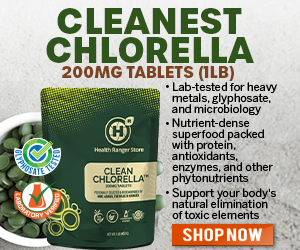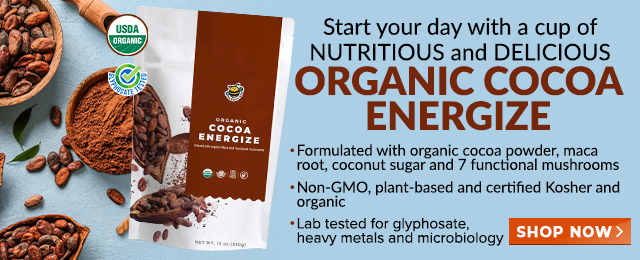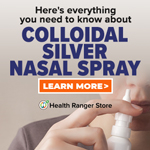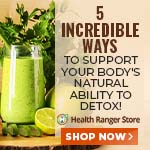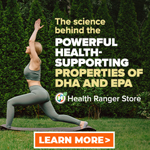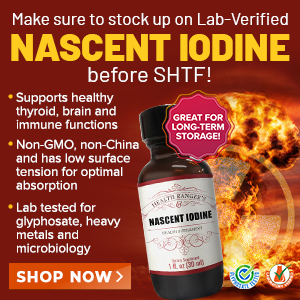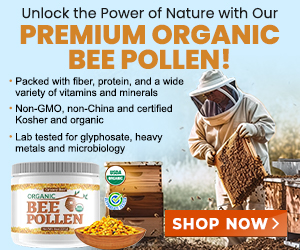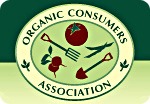
Organic Consumers Association's Ronnie Cummings discusses corporate greed and organic milk
 Tuesday, November 28, 2006 Tuesday, November 28, 2006by Mike Adams, the Health Ranger Editor of NaturalNews.com (See all articles...) Tags: organic food, corporate greed, animal rights |
- FOLLOW the REAL VACCINE SCIENCE: Study reveals mRNA in COVID vaccines DOES change your DNA and can catapult TURBO CANCER
- Burning the wrong firewood: What every prepper needs to know
- The Charlie Kirk shooting: A shocking dive into misinformation and deception
- Big Pharma's antidepressant fraud exposed: Landmark teen study hid harms, showed no real benefits
- Breaking down Charlie Kirk's assassination and the Israel connection
- Israel's "suicide APCs" flatten Gaza City: Remote-controlled robots loaded with 7 tons of explosives wipe out neighborhoods
- NASA warns of solar storm chaos as sun's unexpected awakening threatens global blackouts
- Why credit scores are falling, and what it means for consumers
- Journal axes editor after publishing paper in defense of carbon dioxide
- Cocoa extract may slow aging process by reducing chronic inflammation, major study finds
- The energy gridlock: Trump’s executive order pits affordable energy against green alternatives
- Beyond partisanship: Exposing Cassidy’s anti-MAHA ties to Big Pharma
- Mediterranean diet slashes gum disease risk by fighting inflammation, study reveals
- Skin rejuvenation without toxins: The science-backed natural alternatives big beauty doesn't want you to know
- AI arms race & big tech censorship: Machines compete for resources while suppressing lifesaving knowledge
- “Pottenger’s Cats”: The feline experiment that transformed our understanding of nutrition
- Russia, Europe, and the economic ripple effects of sanctions and energy supply shocks
- Forensic science in crisis: Flawed methods lead to wrongful convictions
- Why We Need the Charlie Kirk Free Speech Act: A Legal Shield Against the Censorship Industrial Complex
- Liberalism is More than a Mental Illness – It’s TERRORISM against America’s Youth
- A Billion Voices of Truth: Mike Adams Announces “Moonshot” Mission to Empower Humanity with Hidden Knowledge
- Urgent Wake-Up Call: The Coming AI Robot Wars and the Great Human Unity
- The assassination of Charlie Kirk: A grave blow to free speech in America
- Ilhan Omar sparks outrage with comments on slain conservative activist Charlie Kirk
- Alleged Kirk assassin’s radical left ties and chilling messages spark national security alarm
- A Stanford doctor's 661 studies proving “vaccines are safe” crumbled under expert scrutiny presented by attorney Aaron Siri
- New MAHA plan aims to tackle childhood health crisis with over 120 initiatives
- Government reading your text messages? EU debates child safety measures, facing widespread opposition to Chat Control 2.0
- How a nasal spray vaccine could turn Americans into walking bioweapons this Fall
- The AI Data Center Wars Have Begun… Farms, Water and Electricity is Stripped from Humans to Power the Machines
- Landmark study exposes alarming health risks in vaccinated children - after years of suppression
- Allegations about FBI evidence in Charlie Kirk assassination prompt calls for transparency
- Candace Owens reveals Charlie Kirk's secret struggle with Israel's pressure campaign
- Franken-butter: Startup backed by Bill Gates creates butter from thin air
- 18 MILLION COVID-JABBED Japanese folks shown to have SIGNIFICANTLY HIGHER DEATH RATES during first year after injection with mRNA clot shots
- Breaking down Charlie Kirk's assassination and the Israel connection
- Urgent Wake-Up Call: The Coming AI Robot Wars and the Great Human Unity
- The AI Data Center Wars Have Begun… Farms, Water and Electricity is Stripped from Humans to Power the Machines
- The War on Light: How Governments and Big Pharma Keep You Sick By Blocking Healing Photons
- The Coming Gold Revaluation: Strategic Financial Realignment in an Era of Dollar Collapse
- EXCLUSIVE REPORT: The Trump-Putin Meeting in Alaska - A Historic Pivot that Redefined Global Power
- 18 MILLION COVID-JABBED Japanese folks shown to have SIGNIFICANTLY HIGHER DEATH RATES during first year after injection with mRNA clot shots
- AI & economic liberty: Will decentralized tech save human autonomy?
- How a nasal spray vaccine could turn Americans into walking bioweapons this Fall
- Security clearances revoked for 37 Biden/Obama officials as Gabbard targets “weaponized intelligence”
- Brussels-Washington trade deal grinds to halt amid clash over digital CENSORSHIP laws
- Franken-butter: Startup backed by Bill Gates creates butter from thin air
- Trump admin mulls travel bans on EU officials behind digital censorship laws
- U.S. State Department condemns “buffer zones” outside U.K. abortion clinics as assault on free speech and religious liberty
- Coral resilience defies climate doom: New studies reveal ancient reefs flourished in warmer seas
- AI takeover: 50% of remote jobs to be replaced within 3 years as machines outperform humans in fairness and accuracy
- Brazil’s digital identity push: For child safety or state control?
- EU’s Media Freedom Act criticized as gateway to censorship and state control
- Egg prices stabilize as supply recovers - analysts blame mass culling under Biden for earlier spike
- Red Cross issues warning to stop blood plasma donations from vaccinated people
- EPA advisor admits the agency is funneling billions to climate groups ahead of Trump’s return to White House
- Newly released JFK files reveal Pentagon's role in creating Lyme disease and covid in the same lab
- Scientists confirm: GENIUS brain function can be spontaneously unleashed in humans without any apparent cause
- HYSSOP: What research reveals about the health benefits of this ancient holy herb
- Two containers with completed ballots fall out of truck in Florida
- Eleven days before Iran bombed Tel Aviv, my microscope revealed haunting images of EXACTLY what would happen
- Morphic resonance “remote viewing” reveals iconic Middle East images of stealth bombers, a falcon and a one-horned ram
- Mike Adams releases country western hit single: Goin’ Back in Time is Comin’ Home
- DECENTRALIZED SPIRITUALITY and the true teachings of Christ: Overcoming the censorship, threats and lies of organized religion to truly know God and the Universal Christ
- Global leaders unite to clamp down on “misinformation” with UN-backed Cascais Declaration
- BOMBSHELL: Covid-19 mRNA nanoparticles EMIT LIGHT SIGNALS that communicate MAC addresses used for self-assembly inside the blood vessels
- I Want My Bailout Money – new song released by Mike Adams
- HEALTH SECRETS: How to Instantly Block MSG Toxicity Using Natural Substances (and the secret of Methylene Blue)
- BOMBSHELL: DNA testing kits are a SCAM to develop ethnic-specific bioweapons
- The Health Ranger releases “Vaccine Zombie” song and music video, using AI-animated zombies for the music video
- BOMBSHELL: Internal Pfizer documents exposed and reveal at least 16 PERCENT of their mRNA vaccine "adverse events" are REPRODUCTIVE DISORDERS
- Michael Yon warns of a ZIONIST TAKEOVER in Trump’s second administration
Ronnie: Well, the good news is, there is such a huge demand for organic products across the United States and North America that there is a serious shortage of supply. One of the types of products that are in serious short supply is organic milk. This is already more than a $1 billion a year industry in the United States out of the $15 billion in organic food sales last year.
The problem is that our government -- specifically the U. S. Department of Agriculture -- takes about $90 billion of our tax money every year and they give subsidies to all of these factory farms to go organic, but they give no subsidies to help family-scale dairies make the transition to organic. We literally do not have enough family farmers with the wherewithal to achieve organic certification and make the product.
At the same time, we have these giant retail giants like Wal-Mart who have noticed that the public wants organic food and they are willing to pay a premium price for it, so organic and the other retail chain stores have moved with a vengeance to dominate the organic market. Wal-Mart is now the No.1 seller of organic milk in the country. The problem is that the milk they are selling -- Horizon Organic -- is not really organic. It is coming from the factory-style dairy farms where the animals are kept in intensive confinement and have been imported from conventional farms as calves. They simply label it organic, and the USDA lets them get away with it.
Mike: Let us get into more detail on that, because I want people to understand how they do an end run around this organic label. First, do you agree that there is some degree of success in the fact that consumer demand for organic products is now so strong? Is that not a success by itself?
Ronnie: It is a tremendous success. It is attributed to the fact that a lot of us spent the last 30 years building up an alternative food and farming system in the United States. This alternative system has proved to be much better than industrial agriculture, and so now the latest polls show 75 percent of Americans say they are shopping for healthier food. If you look at the statistics, about 12 cents of every grocery store dollar are going for foods that are labeled as either natural or organic.
Mike: Well, that is a substantial sum. That is growing at what, about 20 percent a year or something?
Ronnie: Growing at 20 percent a year, whereas conventional food sales tend to grow about 2 percent a year. This 20 percent a year growth has been steady ever since 1991. It appears that it will continue through the end of this decade, so by then most food sold in grocery stores will have a label that says natural or organic.
The question is: If we let these gigantic corporations like Horizon and Organic and Wal-Mart take over the industry, will it really be organic?
Mike: Let's talk about the definition of organic, then. What should organic really mean in terms of, not only the treatment of the cows, but also what chemicals are not in the milk, for example? What is the real definition?
Ronnie: There are organic farmers all over the world -- in about 100 countries -- who are certified organic nowadays. Traditionally organic has always meant that you raise crops without chemical pesticides or chemical fertilizers, and that you raise animals without drugging them up with hormones or antibiotics. You cannot take sewage sludge and put it on farmlands. You cannot feed animals things like blood, slaughterhouse waste, manure and municipal garbage, and you cannot use untested and hazardous technologies like genetic engineering or fruit irradiation. The animals have to be raised on pasture -- which is their natural behavior -- where every day of the growing season, weather permitting, they are out on pasture eating grass and foraging as they have evolved to do.
What has happened recently is that Wal-Mart was buying their organic milk from genuine organic dairy farmers that pastured their animals, and then they turned around to that company -- Organic Valley -- and they said, "Hey, we want a lower price," just as Wal-Mart always does. Organic Valley said no, so Wal-Mart then turned to Dean Foods, the largest dairy conglomerate in the world -- which had bought out Horizon Organic -- and said, "Would you sell to us?" To which Horizon said, "We will sell you the cheapest organic milk you have ever seen."
Horizon conveniently took advantage of the fact that Federal Organic Standards say the cows must have access to pasture, and they said, "Oh well, I guess theoretical access to pasture is good enough. We are going to chain up our cows and milk them three times a day, and they will never get out pasturing unless there is a news organization coming to the farm that day. We will still call it organic." They have been doing this for four years, and there have been complaints from the Organic Consumers Association and organic farmers all over the country.
The U.S. Department of Agriculture has completely ignored these complaints for four years. However, now this controversy has reached such a state with the mass media covering it and retail stores across the country starting to drop Horizon and Aurora Organic, that the USDA is finally making noises that they will clear up this situation and promulgate federal regulations that actually require the animals to be pastured.
They will make sure that the animals were not imported from some conventional dairy farm where they were weaned on blood; fed antibiotics, slaughterhouse waste, and chicken manure; and then called organic. The animals must be raised from birth as organic, and they must be pastured every day during the growing season -- a minimum of 120 days a year. This is what organic has always meant in terms of raising cows, and it is what it should mean now.
Mike: Now, these are pretty serious accusations of Horizon Milk or Dean Foods' behavior. How are you able to support this? Do you have an insider taking pictures, or how did you become aware of this behavior on their part?
Ronnie: It was called to our attention by a watchdog organization called The Cornucopia Institute, which actually visited some of these factory-style dairy farms that Horizon and Aurora call organic. They witnessed firsthand things like a farm where there are 4,000 animals, but only a few hundred acres of pasture. You cannot possibly pasture animals on that little pasture, especially when they are in semi-arid parts of Idaho, Colorado and West Texas.
Then beyond that, workers on these farms started coming forth as whistleblowers. There was a story in the Chicago Tribune about one of these whistleblowers who pointed out that these cows are not put out to pasture. The only time they are put out to pasture is when there is a media organization or an important person coming out.
Yes, it is firsthand information. It is a look at the terrain that these factory-style dairy feedlots are set on. Look at the size of their pasture, and then the fact that there was a national survey of organic dairy farms that came out March 22 -- which the unethical dairies did not respond to or they got really low ranks --whereas, the ethical producers were happy to be transparent about their practices.
The good news is, almost all the organic farmers in the country are actually practicing real organic standards. The bad news is that the market leader, Horizon Organic, and their junior partner, Aurora Organic, are flagrantly violating organic standards to the point where we, the Organic Consumers Association, had to call for a boycott. We have never called for a boycott against an organic product before. This was going too far, so starting in early April, we called on consumers across the country to start boycotting the products of Horizon Organic and Aurora Organic, and to boycott the brand names that the leading retailers are selling from Horizon and Aurora at Wal-Mart, Costco, Safeway, Giant, Publix, and Wild Oats.
Mike: Well, this seems like a clear case in which big business is now seeing dollar signs whenever the word "organic" appears, so they are doing the minimum necessary or even just blatantly violating the rules in order to put that word on their products, regardless of the spirit of the law or the original intent of organics. Is this just corporate greed?
Ronnie: This is, and the sad thing is, how easy it would be to help 5,000 or 10,000 conventional family farmers make the transition in their dairies to organic. It would not be that hard. It would not cost that much money, and this way we could still have organic standards that were real, animals treated humanely and not damage the environment.
Of course, we have not even mentioned that one of the reasons you want organic animals to be outdoors and pastured is because the quality of the meat and milk is much higher if the animals are raised naturally on grass. The other organic requirements mean that the end product is going to be healthier as well. They are not going to have antibiotic residues or genetically engineered hormones. They are not going to be spreading mad cow disease and so on. We, right now in the United States, have an excess of milk being produced by family-scale dairy farmers who are not yet organic. It would be very simple to help those who want to make the transition do so if we were to force the government to give us a fair share of our subsidies to help these farmers do that.
Mike: Now, you mentioned that pasture-fed cows are healthier cows. This gets back to something you mentioned earlier that needs to be emphasized, because most people simply do not believe this is happening. Conventional cows, in fact, are being fed chicken litter and other animals.
Ronnie: Yes, they take it from birth. Cows were traditionally weaned on their mother's milk, but industrial agriculture figured out that it's pretty expensive to wean the calves on milk, so they decided to wean them on blood. That is common practice nowadays on a conventional dairy farm. Then, you feed them primarily grains that are genetically engineered, but mixed in with those grains are things that make the animals grow faster and put on weight like slaughterhouse waste; basically ground up pigs, chickens, dogs, cats and everything else are fed to them.
They found out all these factory poultry farms around the country were producing billions of pounds of manure that pollute the environment. What can we do with all this manure? Presto, they feed it back to cows. They sweep up the manure, the feathers and the dropped bits of cattle that are fed to chickens in their feed. They sweep that all up, turn around, and feed it back to cows.
Most people in the United States are shocked when they hear that 80 percent of the drugs and antibiotics made in this country are not fed to humans to cure them of some illness, but fed to animals in their feed every day to make them grow faster. Scientists do not totally understand why, but they do know that if you cram thousands of animals together in unsanitary or unhygienic -- not to mention inhumane -- conditions, they all get sick and die.
The only way to keep them alive is to constantly feed them antibiotics. Of course, what that means is you turn around and drink a glass of dairy milk from a conventional farm, and you are getting residues of antibiotics in every drink. They also figured out, "We could use our genetically engineered hormone to shoot up these cows with this hormone produced by Monsanto, even though it is banned in just about every industrialized country in the world except for the United States." If you shoot up dairy cows with this hormone, you can force them to give more milk, and you can keep milking them even past their lactation period. You can actually milk a cow not for a year, but for up to a thousand days. Of course, the cow will drop dead after that, but they do not care.
For all these reasons, there is a huge movement on the part of American consumers and especially concerned parents and concerned grandparents -- if they drink milk and if their kids and grandparents drink -- to switch to organic.
Mike: Is it fair to say, Ronnie, that the organic-labeled Horizon Milk on the shelves in Wal-Mart right now comes, at least in part, from cows that were at one point in their lives fed blood, manure, chicken litter and some other things you mentioned? Is that accurate?
Ronnie: Yes, half of Horizon Organic's milk today comes from these factory dairy feedlots. One hundred percent of Aurora Organic's milk comes from these factory dairy feedlots. It is cheaper to not buy organic calves that have been raised from birth on an organic farm, but to buy conventional calves that have been raised as cheaply as possible on a conventional farm. The routine practice today on a conventional farm is feeding the animals blood plasma as a milk replacer. You feed them genetically engineered grains, slaughterhouse waste, and chicken manure. That is industry standard. Why? You can make more money doing it that way.
Mike: Okay, so for those reading this, take a closer look at that bowl of cereal next time. If you are pouring cow's milk in there, you might want to buy genuine organic and not the cheap stuff.
Ronnie: Yes, and Mike here is another point that you might think about: for those people who do not drink dairy milk, but who buy organic soy milk, the leading organic soy milk brand in the United States is Silk. Many consumers have no idea that Silk -- just like Horizon Organic Milk -- was bought out by this giant conglomerate, Dean Foods.
Silk used to buy their organic soybeans from U.S. and Canadian organic soybean farmers, and they paid them a decent price -- $16 to $21 a bushel -- for these organic soybeans. Well, now that Dean Foods has bought out Silk, they are starting to import cheap, so-called organic soybeans from China, where the workers are treated like slaves and organic standards are dubious. Or, they are importing soybeans from Brazil where there is a huge uproar over the fact that people are whacking down the Amazon -- the lungs of the planet -- in order to plant export crops, specifically soybeans, to export.
Even if we think this does not affect us, because we do not eat meat or we do not eat dairy, we have to see the effect of these big corporations like Dean Foods coming into organic. Wal-Mart wants to sell you stuff that is cheaper than their competitors, and the only way they can do that is to outsource it from overseas -- places like China and Brazil -- where worker rights and environmental standards are routinely violated, or else lower standards in the United States and allow industrial-style production to call itself organic.
Mike: Now, this is obviously a very important story for consumers to follow. How can they continue to get updates from you on this story?
Ronnie: Every day on our news site, www.OrganicConsumers.org you will find updates. We have a whole section of our website called "Safeguard Organic Standards," where you can take action. Right at the top of our home page is an opportunity for you to send a message to what we are calling the "Shameless Seven." These are the large corporations trying to defraud consumers and put ethical organic farmers out of business by labeling factory farm production -- and slave labor production, in the case of China -- as organic.
Mike: I want to thank you, Ronnie, for taking the time to give us all of this shocking information today.
Ronnie: Thank you.
Organic food at FETCH.news
Get independent news alerts on natural cures, food lab tests, cannabis medicine, science, robotics, drones, privacy and more.
 About the author:Mike Adams (aka the "Health Ranger") is a best selling author (#1 best selling science book on Amazon.com) and a globally recognized scientific researcher in clean foods. He serves as the founding editor of NaturalNews.com and the lab science director of an internationally accredited (ISO 17025) analytical laboratory known as CWC Labs. There, he was awarded a Certificate of Excellence for achieving extremely high accuracy in the analysis of toxic elements in unknown water samples using ICP-MS instrumentation. Adams is also highly proficient in running liquid chromatography, ion chromatography and mass spectrometry time-of-flight analytical instrumentation.
About the author:Mike Adams (aka the "Health Ranger") is a best selling author (#1 best selling science book on Amazon.com) and a globally recognized scientific researcher in clean foods. He serves as the founding editor of NaturalNews.com and the lab science director of an internationally accredited (ISO 17025) analytical laboratory known as CWC Labs. There, he was awarded a Certificate of Excellence for achieving extremely high accuracy in the analysis of toxic elements in unknown water samples using ICP-MS instrumentation. Adams is also highly proficient in running liquid chromatography, ion chromatography and mass spectrometry time-of-flight analytical instrumentation.
Adams is a person of color whose ancestors include Africans and Native American Indians. He's also of Native American heritage, which he credits as inspiring his "Health Ranger" passion for protecting life and nature against the destruction caused by chemicals, heavy metals and other forms of pollution.
Adams is the founder and publisher of the open source science journal Natural Science Journal, the author of numerous peer-reviewed science papers published by the journal, and the author of the world's first book that published ICP-MS heavy metals analysis results for foods, dietary supplements, pet food, spices and fast food. The book is entitled Food Forensics and is published by BenBella Books.
In his laboratory research, Adams has made numerous food safety breakthroughs such as revealing rice protein products imported from Asia to be contaminated with toxic heavy metals like lead, cadmium and tungsten. Adams was the first food science researcher to document high levels of tungsten in superfoods. He also discovered over 11 ppm lead in imported mangosteen powder, and led an industry-wide voluntary agreement to limit heavy metals in rice protein products.
In addition to his lab work, Adams is also the (non-paid) executive director of the non-profit Consumer Wellness Center (CWC), an organization that redirects 100% of its donations receipts to grant programs that teach children and women how to grow their own food or vastly improve their nutrition. Through the non-profit CWC, Adams also launched Nutrition Rescue, a program that donates essential vitamins to people in need. Click here to see some of the CWC success stories.
With a background in science and software technology, Adams is the original founder of the email newsletter technology company known as Arial Software. Using his technical experience combined with his love for natural health, Adams developed and deployed the content management system currently driving NaturalNews.com. He also engineered the high-level statistical algorithms that power SCIENCE.naturalnews.com, a massive research resource featuring over 10 million scientific studies.
Adams is well known for his incredibly popular consumer activism video blowing the lid on fake blueberries used throughout the food supply. He has also exposed "strange fibers" found in Chicken McNuggets, fake academic credentials of so-called health "gurus," dangerous "detox" products imported as battery acid and sold for oral consumption, fake acai berry scams, the California raw milk raids, the vaccine research fraud revealed by industry whistleblowers and many other topics.
Adams has also helped defend the rights of home gardeners and protect the medical freedom rights of parents. Adams is widely recognized to have made a remarkable global impact on issues like GMOs, vaccines, nutrition therapies, human consciousness.
In addition to his activism, Adams is an accomplished musician who has released over a dozen popular songs covering a variety of activism topics.
Click here to read a more detailed bio on Mike Adams, the Health Ranger, at HealthRanger.com.
Take Action: Support Natural News by linking to this article from your website
Permalink to this article:
Embed article link: (copy HTML code below):
Reprinting this article:
Non-commercial use OK, cite NaturalNews.com with clickable link.
Follow Natural News on Facebook, Twitter, Google Plus, and Pinterest
Science News & Studies
Medicine News and Information
Food News & Studies
Health News & Studies
Herbs News & Information
Pollution News & Studies
Cancer News & Studies
Climate News & Studies
Survival News & Information
Gear News & Information
News covering technology, stocks, hackers, and more



"Big Tech and mainstream media are constantly trying to silence the independent voices that dare to bring you the truth about toxic food ingredients, dangerous medications and the failed, fraudulent science of the profit-driven medical establishment.
Email is one of the best ways to make sure you stay informed, without the censorship of the tech giants (Google, Apple, Facebook, Twitter, YouTube, etc.). Stay informed and you'll even likely learn information that may help save your own life."
–The Health Ranger, Mike Adams











